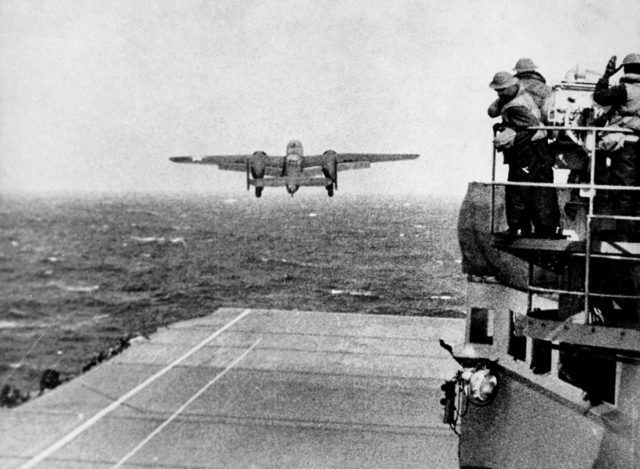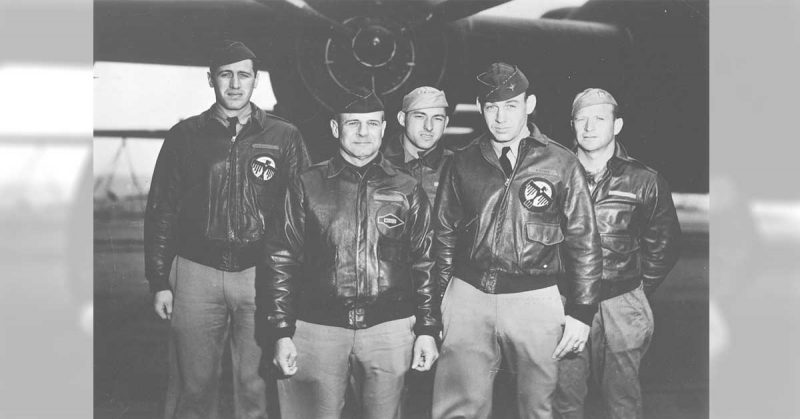Have you ever wondered what it was like to undertake a bombing mission during WWII? If you have, then an upcoming event being held at the Fort Collins-Loveland jetCenter at the Northern Colorado Regional Airport, 4824 Earhart Road, Loveland will surely interest you.
The event is being held to raise funds for the Vintage Aviation Museum which was started at Salem, Oregon but is being moved to Utah. This is a worthy enterprise to support, but the main speaker at the fundraising dinner event will be the last surviving member of the Doolittle Tokyo Raiders, Lt. Col. Richard Cole, accompanied by Jim Bower, son of one of the pilots on the raid, the late Bill Bower.
In an interview with the Loveland Reporter-Herald, Cole described the mission that he flew as co-pilot to the leader of the mission Lt. Col. Jimmy Doolittle on the 18th April 1942. This extremely successful raid raised the morale of the American people and brought military honors to the 80 man team.
Any account of WWII will surely include the Japanese surprise attack on Pearl Harbour and the dreadful losses incurred by the American Navy on that occasion. Not many accounts, however, will include one of the American responses to that attack, being the raid led by Lt. Col. Jimmy Doolittle to bomb Tokyo four months after Pearl Harbour.
The effect that the Pearl Harbour raid had on the American public and the blow to the morale of the American troops could not go unchallenged. The Japanese were confident that they were beyond the reach of the American air force, and their technology would alert them to the presence of the Navy in plenty of time to mount a counter-attack, but they underestimated the fury of the American military. An audacious plan was hatched where 16 Mitchell B-25 bombers would be loaded onto the USS Hornet, a new aircraft carrier before she sailed from her base in California. The bombers would then take off when they were 400-600 miles from Tokyo, fly beneath the radar, drop their bombs on the target, and fly on to China where they would land. The bombers could not land again on the aircraft carrier.
This entire plan revolved around the element of surprise. The Army’s new B-25 medium-range bombers had never been flown off an aircraft carrier, but they did increase the air reach, and hopefully, the planes would arrive on target before the Japanese were aware of the ploy.
On the morning of the 18th April 1942, the flotilla was unlucky to run across a Japanese patrol ship, which radioed a warning to the Japanese mainland, thus forcing the Americans to put their plan into effect early. They were 200 miles further out than the plan originally called for, making the entire raid that much more dangerous as the planes would run out of fuel much earlier than scheduled.

None of the members of the squadron wavered when Doolittle told them that they were leaving early and that the danger level had risen. Doolittle, with Cole as his co-pilot, took off first and soon all 16 bombers were in the air and on course for Tokyo. The bombers all reached their target and dropped their load of bombs successfully. They then flew on towards China, but the early take off now took its toll; one crew landed in Soviet held territory and were imprisoned for a year, four crash landed, but most of the aviators had to bail out over China before they reached safe landing strips. Of the 80 men on the raid, three died that same night, eight were captured by the Japanese and of the eight, three were executed, one died as a prisoner of war, and the remaining four returned to America after the war.
In the interview, Cole readily admitted that the raid was frightening as it was their first combat mission but nothing was more frightening than parachuting into the dark of the night with no idea of what was lying below. “I was scared the whole time. I think the other guys were, too. When you’re in a group that you know is going to go into combat, and you don’t know exactly how much combat it’s going to be — and a lot of things are going to happen between the carrier and the target — all these things enter in your mind if you think about it. For me, the worst part was standing in the airplane … looking down at the black hole,” he said. “If you wanted to live, you had to bail out. That was the scariest time.”
Cole was lucky to land in the branches of a tree, where he hung for the rest of the night. Within a few days, he was reunited with Doolittle and the rest of the raiders, and they were assisted by Chinese guerrillas to return to the American lines. Cole remembers that Doolittle was convinced that the raid was a failure and that he would be subject to a court martial for losing all his planes when he returned to the US. This proved not to be the case, and he and those men that returned with him were hailed as heroes and toured the US drumming up support for the war effort.
Cole remained in the Far East and he, along with five other Raiders, flew for 14 months on missions to supply the Chinese guerrillas. They flew what was known as the ‘Hump Route,’ which was plotted over the Himalayan foothills, a dangerous route that offered no chance of recovery should the plane go down. After this, he moved on to fly with the First Air Commandos providing air support for the invasion of Burma, Reporter-Herald reported.
Cole never considered himself a hero; to him, the raid was simply doing his duty. He said, “If you live in a country and enjoy the amenities that country has to offer, and you claim your loyalty to that country, and it is attacked, unless the politicians can straighten it out first, then you have no alternative. The natural thing to do was to fight back.”
“I was proud I was able to serve, to the degree I was able to help the country,” he said. “And I’m proud that I lived through it.”
There are fewer and fewer WWII veterans alive nowadays and to get the chance to listen to one that few such an auspicious mission will be fascinating. Do not miss this Living-history event that will give you a glimpse into the life that these incredibly brave men led during those first days after America’s entry into the war. The event is arranged for 3rd June, beginning at 4:00 pm with an autograph session, followed by dinner at 5:00 pm and then Ret. Lt. Col. Richard ” Dick ” Cole will give his talk. Time will be allocated for the audience to ask questions.
